实义动词have(有)的用法【精品PPT】
have的用法句型结构和用法
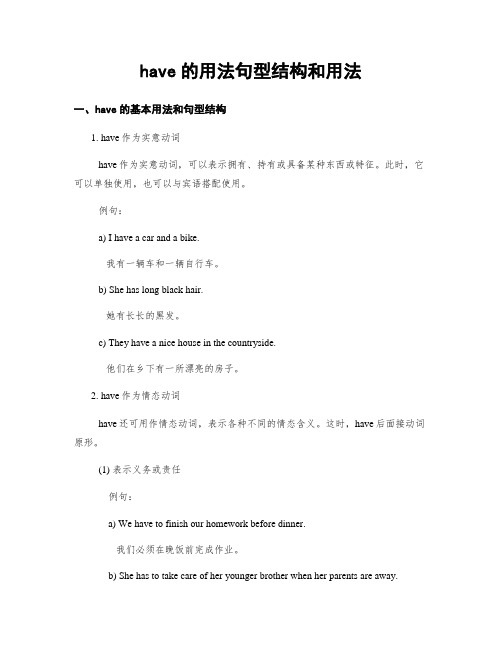
have的用法句型结构和用法一、have的基本用法和句型结构1. have作为实意动词have作为实意动词,可以表示拥有、持有或具备某种东西或特征。
此时,它可以单独使用,也可以与宾语搭配使用。
例句:a) I have a car and a bike.我有一辆车和一辆自行车。
b) She has long black hair.她有长长的黑发。
c) They have a nice house in the countryside.他们在乡下有一所漂亮的房子。
2. have作为情态动词have还可用作情态动词,表示各种不同的情态含义。
这时,have后面接动词原形。
(1) 表示义务或责任例句:a) We have to finish our homework before dinner.我们必须在晚饭前完成作业。
b) She has to take care of her younger brother when her parents are away.父母不在家时,她得照顾弟弟。
(2) 表示允许或许可例句:a) You can have some cake if you want.如果你想要的话,你可以吃点蛋糕。
b) Students are not allowed to use mobile phones during class.学生上课期间不允许使用手机。
(3) 表示可能性或推测例句:a) It may have rained last night, the ground is wet.昨晚可能下过雨,地面都湿了。
b) She might have missed the bus. She's not here yet.她可能错过了公交车。
她还没到。
二、have的常见短语用法1. have a good/bad time意思是度过愉快/糟糕的时光。
例句:We had a good time at the party last night.昨晚在派对上我们玩得很开心。
have的用法及句型 (2)

have的用法及句型一、详解“have”的基本用法及常见句型1. 作为实义动词“Have” 在英语中既可作为主动词,也可作为连系动词。
作为实义动词时,它有以下几种常见的用法和句型。
(1) 拥有某物:在这个意义上,“have” 表示拥有或持有某个对象或特征。
例:I have a car. (我有一辆汽车。
)She has beautiful hair.(她长着漂亮的头发。
)(2) 经历某种感受或情绪:在这个意义上,“have” 表示经历、感到或经受某种感受或情绪。
例:He had a great time on vacation.(他度过了一个愉快的假期。
)I often have nightmares.(我经常做噩梦。
)(3) 进行活动或行为:在这个意义上,“have” 表示参与或从事某种活动或行为。
例:We are having dinner at the restaurant tonight.(我们今晚要去餐厅吃饭。
)He usually has breakfast before going to work.(他通常在去上班前吃早餐。
)2. 作为情态动词“Have” 还可以作为情态动词,用于构成一些特殊的句型和表达方式。
(1) 表示义务或责任:在这个意义上,“have to” 表示某种必须或需要做的事情。
例:I have to finish my homework before going out.(我必须在出去之前完成作业。
)They have to follow the rules in order to succeed.(他们必须遵守规则才能成功。
)(2) 表示推测或猜测:在这个意义上,“have” 用于构成一种推测或猜测的语气。
例:She must have forgotten her keys.(她一定忘记带钥匙了。
) They might have gone to the movies.(他们可能已经去看电影了。
have的各种意思及用法
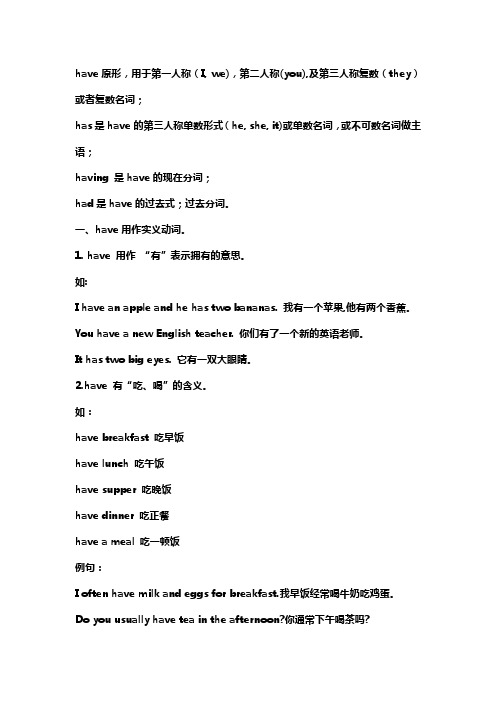
have原形,用于第一人称(I, we),第二人称(you),及第三人称复数(they)或者复数名词;has是have的第三人称单数形式(he, she, it)或单数名词,或不可数名词做主语;having 是have的现在分词;had是have的过去式;过去分词。
一、have用作实义动词。
1. have 用作“有”表示拥有的意思。
如:I have an apple and he has two bananas. 我有一个苹果,他有两个香蕉。
You have a new English teacher. 你们有了一个新的英语老师。
It has two big eyes. 它有一双大眼睛。
2.have 有“吃、喝”的含义。
如:have breakfast 吃早饭have lunch 吃午饭have supper 吃晚饭have dinner 吃正餐have a meal 吃一顿饭例句:I often have milk and eggs for breakfast.我早饭经常喝牛奶吃鸡蛋。
Do you usually have tea in the afternoon?你通常下午喝茶吗?What do you often have for your three meals?你的一日三餐通常吃什么?3.have 用来描述病情。
如:have a cold 感冒have a toothache牙痛have a fever发烧have a sore back背痛例句:“What’s the matter?”你怎么了?“I have a toothache.”我牙疼。
4. have to 不得不,与must意思相同。
如:I have to tidy my room.我不得不整理房间。
She has to help with the washing.她得帮忙洗衣服。
You don't have to go if you don't want to.如果你不想去,你就不必去。
Have的用法总结PPT课件
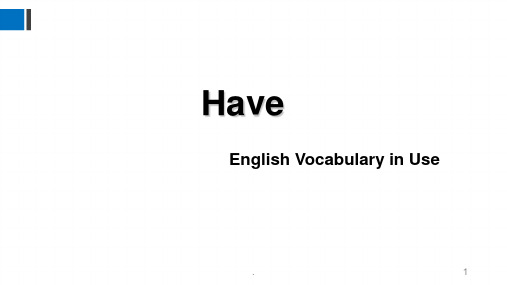
Have:
• 1: 拥有,持有 own, hold: I don't have that much money on me.
• 2: 性质,特征 quality, feature: They have a lot of courage.
• 3: 有(表示 relationship): He's got three children.
Making a sentence by using these words and expressions
.
5
C: Expressions
• Have a look = look at it
• have a go = ride it
• have a good journey
• have a moment = have some time
8
Exercises & Homework
.
9
• journey
• competition
• hairdresser
• appointment
• postcard
• dentist
• have a headache
• camera
• have to = must
• have a look
• situation
• bicycle
• museum
.
.
2
Warming up (A):
•Q: What can you have:
You can ...
1: have lunch
2: have a party
3: have a lesson
4: have a cup of tea / coffee
实义动词have的用法
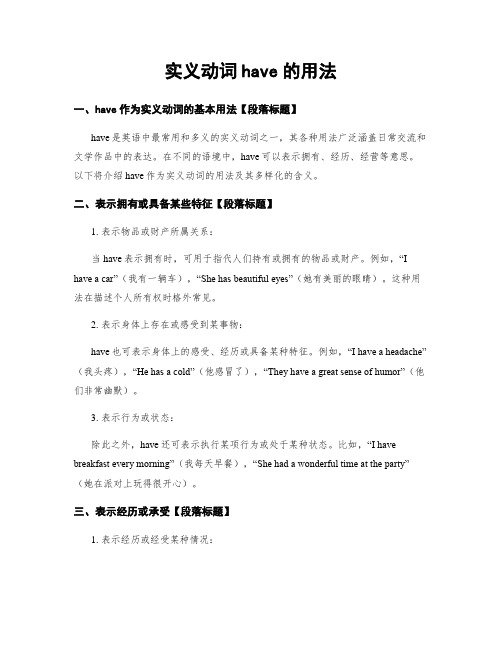
实义动词have的用法一、have作为实义动词的基本用法【段落标题】have是英语中最常用和多义的实义动词之一,其各种用法广泛涵盖日常交流和文学作品中的表达。
在不同的语境中,have可以表示拥有、经历、经营等意思。
以下将介绍have作为实义动词的用法及其多样化的含义。
二、表示拥有或具备某些特征【段落标题】1. 表示物品或财产所属关系:当have表示拥有时,可用于指代人们持有或拥有的物品或财产。
例如,“I have a car”(我有一辆车),“She has beautiful eyes”(她有美丽的眼睛)。
这种用法在描述个人所有权时格外常见。
2. 表示身体上存在或感受到某事物:have也可表示身体上的感受、经历或具备某种特征。
例如,“I have a headache”(我头疼),“He has a cold”(他感冒了),“They have a great sense of humor”(他们非常幽默)。
3. 表示行为或状态:除此之外,have还可表示执行某项行为或处于某种状态。
比如,“I have breakfast every morning”(我每天早餐),“She had a wonderful time at the party”(她在派对上玩得很开心)。
三、表示经历或承受【段落标题】1. 表示经历或经受某种情况:have还可以表示经历过一些特定的情况。
例如,“We had a difficult time during the pandemic”(我们在疫情期间度过了困难时光)。
此外,have还可用于表示某种不愉快的遭遇或事件,如“have an accident”(发生事故)。
2. 表示接受指责或控制:有时候,have也可以表示承受某种责备、指责或处于控制之下。
比如,“He had to face the consequences of his actions”(他必须面对自己行为所造成的后果),“The country had no choice but to comply with the regulations”(该国别无选择,只能遵守这些规定)。
英语语法实用课件之have

3.和一与动词同形的名词连用,表示一个动作(have+a+由动词转化和名词)。 Are you going to have a swim. I have a long talk with the teacher. .4.have on sth.或have sth. on,表示“穿着”、“戴着”(=to be wearing)。 I noticed he had on bedroom slippers. At the ball Motile had a diamond necklace on. 5.表示“吃”、“喝”。 I wanted to have a cup of tea and some eggs. Does she have lunch at home? 6.组成复合结构即“have+宾语+宾语补足语”。 (1)不加to的动词不定式作宾语补足语(have sb. do sth.),表示让、叫某人做某事。 The soldier had him stand with his back to his father 〔注〕:否定结构表示“不能让…”或“从未有人…”. We won't have you blame it on others. She had never had anybody speak to her that way before. (2)现在分词作宾语补足语(have sb.(sth.)doing),表示让(使)某人做某事。 …the two men had their lights burning all night long….
动词have是中学英语课本中出现频率较高的一个普通单词。它既可作及物动 词,也可以用作助动词,其基本意义是“有、拿、受、取、吃、喝、让……”。 大 多数同学对have表示某人或某物拥有某物的用法比较熟悉。例如: I have a new pencil-box. He has two coats. A desk has four lezs. 但对have的使役用法却知之甚少,或者说对这种用法掌握得还不太好。下面 就让我们通过例句来阐明动词have的使役用法。请看下面的例句: 1.He had me mend his bike. 他请我给他修理自行车。 2.The old man had a small house built, for him. 那位老人让人为他建一个小房子。 3.The naughty boy may have me hit. 那个调皮的男孩可能会让人打我。 4.The teacher had the naughty boy standing outside the classroom. 老师叫那位调皮的男孩站在教室外面。 5.I have my friend waiting for me. 我有朋友在等着我。 6.You should have her here. 你应该要她到这里来。
语法之动词have的用法

初一年级下三、动词have的用法动词have在中学英语中的用法一、have作实意动词。
1. 表示“有”的意思。
Look, I have wings, just like you. He had fair hair and blue eyes.(注1):其否定和疑问形式变化,在美国通常用助动词do。
(注2):在英国口语中常用have got代替have.Look, can't you see I've got teeth, too? I haven't got any jewelry.2. have和一些其他名词连用,表示:(1)一种活动。
We have no classes on Sunday.(上课)They're going to have a volleyball match.(举行比赛)Are we going to have a meeting this week?(开会)We are going to have a talk this afternoon.(谈话)(2)患病。
I have got a headache. I have a bad cold.(3)发生的情况。
I've had so many falls that I'm black and blue all over.(4)生育。
The queen ant may have tens of thousands of babies in one summer.3. 和一个与动词同形的名词连用,表示一个动作(have+a+由动词转化的名词)。
Are you going to have a swim? I have a long talk with the teacher.4. have on sth或have sth on,表示“穿着”、“戴着”(=to be wearing)。
have的五种用法

▪ I have my dinner to cook.
▪ I have my h
▪ 我们刚才请人把机器修好了。 ▪ We had the machine mended just now.
▪ 他(请人给他)理发了。 ▪ He has had his hair cut.
精选完整ppt课件
5
have sth. to do & have sth. to be done
▪ have sth. to do 这一结构中的 have意为“有”,即“有某事要 做”,这件事是由主语来做的,
▪“ have + sb (宾语)+ do sth (宾语补足语)”意 为“让 / 叫 / 使某人做某事”(指一次性的具体的动 作)。此结构中的 have 是使役动词,sb 作宾语,其 后的 do sth 是省去 to 的动词不定式作宾语补足语。
Eg.
▪老板经常要他们一天工作14 个小时。 ▪The boss often has them work for 14 hours a day.
▪ 不要让婴儿啼哭!
▪ Don’t have the baby crying!
▪ 李林,别让狗狂吠不停。
▪ Don’t have the dog barking much,Lilin.
精选完整ppt课件
4
▪ 3. have sth done
“ have + sth (宾语)+ 过去分词(宾语补足 语)”意为“让 / 叫 / 使 / 请别人做某事”。宾 语sth 后面用过去分词作宾语补足语,说明sth 与过去分词表示的动作之间是被动关系。例如:
实义动词have的用法
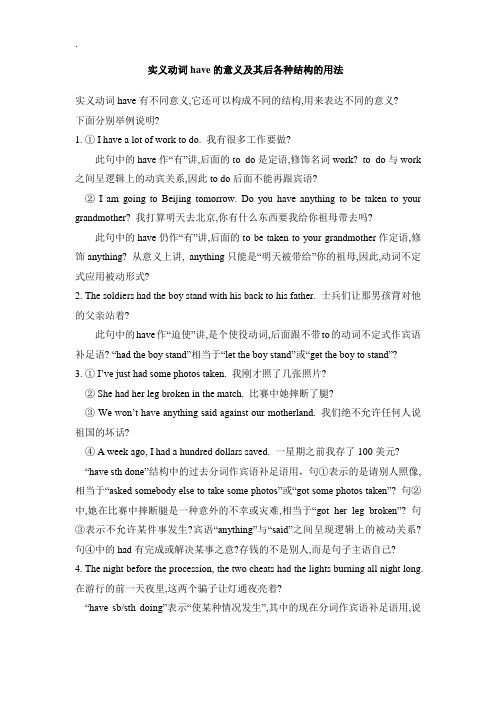
实义动词have的意义及其后各种结构的用法实义动词have有不同意义,它还可以构成不同的结构,用来表达不同的意义?下面分别举例说明?1. ① I have a lot of work to do. 我有很多工作要做?此句中的have作“有”讲,后面的to do是定语,修饰名词work? to do与work 之间呈逻辑上的动宾关系,因此to do后面不能再跟宾语?②I am going to Beijing tomorrow. Do you have anything to be taken to your grandmother? 我打算明天去北京,你有什么东西要我给你祖母带去吗?此句中的have仍作“有”讲,后面的to be taken to your grandmother作定语,修饰anything? 从意义上讲, anything只能是“明天被带给”你的祖母,因此,动词不定式应用被动形式?2. The soldiers had the boy stand with his back to his father. 士兵们让那男孩背对他的父亲站着?此句中的have作“迫使”讲,是个使役动词,后面跟不带to的动词不定式作宾语补足语? “had the boy stand”相当于“let the boy stand”或“get the boy to stand”?3. ①I’ve just had some photos taken. 我刚才照了几张照片?② She had her leg broken in the match. 比赛中她摔断了腿?③We won’t have anything said against our motherland. 我们绝不允许任何人说祖国的坏话?④ A week ago, I had a hundred dollars saved. 一星期之前我存了100美元? “have sth done”结构中的过去分词作宾语补足语用,句①表示的是请别人照像,相当于“asked somebody else to take some photos”或“got some photos taken”? 句②中,她在比赛中摔断腿是一种意外的不幸或灾难,相当于“got her leg broken”? 句③表示不允许某件事发生?宾语“anything”与“said”之间呈现逻辑上的被动关系?句④中的had有完成或解决某事之意?存钱的不是别人,而是句子主语自己?4. The night before the procession, the two cheats had the lights burning all night long. 在游行的前一天夜里,这两个骗子让灯通夜亮着?“have sb/sth doing”表示“使某种情况发生”,其中的现在分词作宾语补足语用,说明现在分词与宾语为主动关系?其否定结构表示“不允许(不能让)某种情况发生”之意?例如: We won’t have you talking to Mother like that?我们不允许你那样和妈妈说话?5. They had people coming to dinner. 他们有客人来吃饭?此句中,可将had译为“有”,有时也可将这种结构中的have灵活译出? coming 在句中作宾语补足语用?又如: I woke up at night only to have water dripping through the ceiling. 我夜里醒来发现天花板往下滴水?6. We had no trouble (in) finding his house. 我们毫不费劲地找到了他的家?此句中的finding是动名词,作介词in的宾语?这里的介词in也可以省略?形式上与其相类似的结构还有have a problem (in) doing sth (做某事有问题),have difficulty (in) doing sth (做某事有困难),have a difficult time (in) doing sth (做某事有困难),have a struggle (in) doing sth (做某事很费劲),have fun (in) doing sth (做某事很有趣),have a good/wonderful/pleasant time (in) doing sth (做某事很愉快)?巩固练习1. —What have you_______ hydrogen, Mary?—Balloons.A. have filled withB. had filled withC. had filled ofD. to have filled2. If your mother and wife are very ill at the same time and you can only help one at a time, who would you rather have_______ to the hospital first?A. sendB. sendingC. sentD. to be sent3. Whom do you think he would_______ a letter of congratulation to the teacher?A. have writeB. have writtenC. have to writeD. have writing4. He had his leg_______ trying to save an eight-year-old boy from a cave-in.A. injureB. to be injuredC. injuringD. injured5. I’m not going to have him_______ up with this sort of business.A. mixB. mixedC. to mixD. mixing6. I can’t have a child of 5_______ for you in the rain.A. waitB. waitedC. waitingD. to wait7. Why do you go to town when you have people_______ with you?A. stayB. stayedC. stayingD. to stayKey: 1-7 BCADBCChave作实义动词1.表示“有”的意思Look, I have wings, just like you.He had fair hair and blue eyes.〔注1〕:其否定和疑问形式变化,在美国通常用助动词do。
have和has的用法 ppt课件
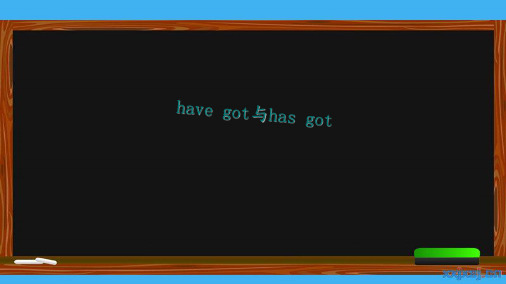
have和has的用法
❖Tips:当主语为单数名词用has ❖ eg: Helen has a nice pen. ❖ This dog has four legs.
have和has的用法
第一人称:I、we have… 第二人称:You have… 复数:They /The girls/The boys/The children/ Ben and Tom
Have got
Has got
Have got 和has got都是“有”的意思,它们之 间也有区别。说到底就是have与has的区别。
精品资料
• 你怎么称呼老师?
• 如果老师最后没有总结一节课的重点的难点,你是 否会认为老师的教学方法需要改进?
• 你所经历的课堂,是讲座式还是讨论式? • 教师的教鞭
• “不怕太阳晒,也不怕那风雨狂,只怕先生骂我笨, 没有学问无颜见爹娘 ……”
• “太阳当空照,花儿对我笑,小鸟说早早早……”
have和has的用法
❖ 当主语为(I 、you、we、they)用have ❖ eg:I/you have an apple. ❖ we/they have two apples. ❖ 当主语为第三人称(he/she/it)用has ❖ eg:He/she has a pencil. ❖ It has four legs.源自用have 和has填空。
1.I h__a_v_e got a cat. 2.He _h_a_s_ got a dog. 3.She _h_a_s_ got a nice pencil. 4.We _h_a_v_egot a big house(房子). 5.They h__a_v_e got a happy family(家庭). 6.It _h_a_s_ got a short tail(尾巴). 7.You h__a_v_e got a good teacher. 8.Helen _h_a_s_ got two big eyes. 9.Tom _h_a_s_ got a red pen. 10.My mother _h_a_s_ got a beautiful nose.
实义动词have(有)的用法-PPT
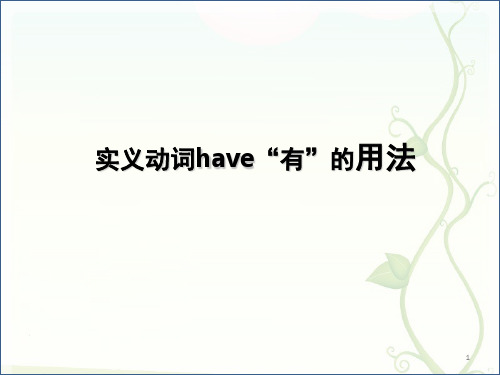
1
实义动词have作“有”讲时,强调“所属关系”,表示“拥有” 的意思。其主语常为人或物。
I have a baseball.
我有一个棒球。
He has two ping-pong bats。 他有两个乒乓球拍。
--Do you have a basketball?
你有一个蓝球吗?
They don’t have apples.
It has a big mouth.
He has twoary has a brother.
It doesn’t have a big mouth.
He doesn’t have two big eyes. She doesn’t have a cat.
第二人称: You have…
第三人称: He / She / It / Jane has…
复 数: They / The girls / The boys /The children /
Ben and Jane have… 3
例句:
• 我有一只狗。 • 你有一家 农场。 • 他们都有苹果。 • 它有一个大嘴巴。 • 他有一双大眼睛。 • 她有一只猫。 • Mary有一个弟弟。
He doesn’t have two volleyballs. 他没有两个排球。
2
1. 实义动词have (有)在一般现在时的肯定句中,当主语 是第三人称单数时用has, 当主语是其他人称时用have。
口诀
我和你都用have, Has 用于他,她,它, 所有复数都用have。
具体用法
第一人称: I have…
You have a farm. They have apples.
实义动词have有的用法ppt课件

在整堂课的教学中,刘教师总是让学 生带着 问题来 学习, 而问题 的设置 具有一 定的梯 度,由 浅入深 ,所提 出的问 题也很 明确
口诀
动词have表示“有”, 位置就在主语后。 “三单”主语用has, 其他人称用have。 一般问句句首do/does添。 否定句子也一样, don’t /doesn’t主语后面站。
单项选择。 在整堂课的教学中,刘教师总是让学生带着问题来学习,而问题的设置具有一定的梯度,由浅入深,所提出的问题也很明确 1. C you have a volleyball?
A. Are B. Is C. Do D. Does
2. I don’t C a tennis bat, but Kate one.
口诀
我和你都用have, Has 用于他,她,它, 所有复数都用have。
具体用法
第一人称: I have…
第二人称: You have…
第三人称: He / She / It / Jane has…
复 数: They / The girls / The boys /The children /
Ben and Jane have…
They have apples.
They don’t have apples.
It has a big mouth.
He has two big eyes. She has a cat.
Mary has a brother.
It doesn’t have a big mouth.
He doesn’t have two big eyes. She doesn’t have a cat.
2. 实义动词have (有)的一般现在时的肯定句变为否定句
have 的用法
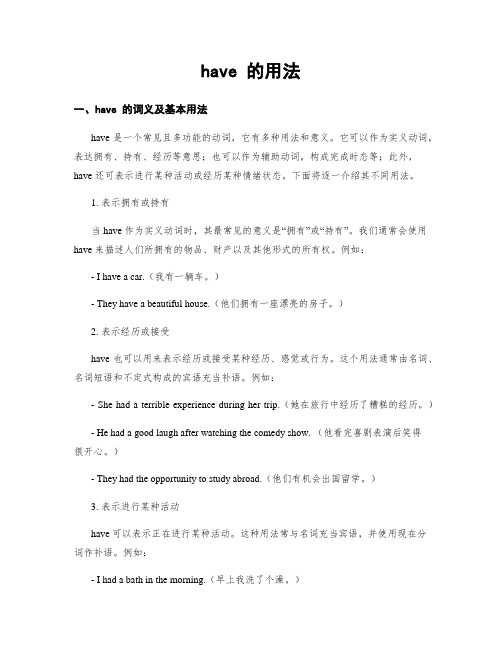
have 的用法一、have 的词义及基本用法have 是一个常见且多功能的动词,它有多种用法和意义。
它可以作为实义动词,表达拥有、持有、经历等意思;也可以作为辅助动词,构成完成时态等;此外,have 还可表示进行某种活动或经历某种情绪状态。
下面将逐一介绍其不同用法。
1. 表示拥有或持有当 have 作为实义动词时,其最常见的意义是“拥有”或“持有”。
我们通常会使用have 来描述人们所拥有的物品、财产以及其他形式的所有权。
例如:- I have a car.(我有一辆车。
)- They have a beautiful house.(他们拥有一座漂亮的房子。
)2. 表示经历或接受have 也可以用来表示经历或接受某种经历、感觉或行为。
这个用法通常由名词、名词短语和不定式构成的宾语充当补语。
例如:- She had a terrible experience during her trip.(她在旅行中经历了糟糕的经历。
)- He had a good laugh after watching the comedy show. (他看完喜剧表演后笑得很开心。
)- They had the opportunity to study abroad.(他们有机会出国留学。
)3. 表示进行某种活动have 可以表示正在进行某种活动。
这种用法常与名词充当宾语,并使用现在分词作补语。
例如:- I had a bath in the morning.(早上我洗了个澡。
)- She had a haircut at the salon.(她到沙龙理发了。
)4. 表示情感状态或思维除了以上用法外,have 还可以表达思维、情感等状态,通常与名词或形容词短语作宾语。
例如:- He had a strong desire to succeed.(他渴望成功。
)- They had mixed feelings about the decision. (他们对这个决定心情复杂。
have和has的用法ppt课件

21. Nancy__h_a_s_____many skirts. 22. David____h_a_s____some jackets. 23. My friends__h_a_v_e_____a football. 24. What do you__h_a_v_e_____? 25. What does Mike___h_a_v_e____? 26. What do your friends___h_a_v_e_____? 27. What does Helen__h_a_v_e______? 28. His brother__h_a_s____a basketball. 29. Her sister____h_a_s___a nice doll. 30. Miss Li___h__a_s____an English book.
12
填写正确的否定形式(don’t/doesn’t)
1.I d_o__n_’t have a cat. 2.He _d_o_e_s_n_’t like dogs. 3.She d_o_e_s_n’t have a long hair. 4.Wed_o_n_’_t have a big house. 5.They d__o_n_’thave a happy family. 6.Itd_o_e_s_n’t have a short tail.
2
Work alone
Complete the following sentences.
I _h_a_v_e_ a big mouth.
You _h_a_v_e a round face.
She\Nancyh_a_s___ long hair. have\ has
He\Mike __h_a_s_ a big head.
have,has用法

have,has用法have,has是英语中常用的动词,表示“有”的意思。
在英语中,have,has的用法比较灵活,常常作为实义动词、情态动词、辅助动词以及省略动词等多种形式出现,在句子中的位置和意义也有所不同。
下面就来介绍一下have,has的用法。
一、作为实义动词表示“有”1. I have a pen.(我有一支笔)2. She has three brothers.(她有三个兄弟)3. They have a big house.(他们有一座大房子)二、作为情态动词除了作为实义动词,“have,has”还可作为情态动词,表示不同的语气和意义,常常用于表示义务、可能、必要等。
例如:1. She has to go to work early.(她必须早早去工作)2. You have to study hard if you want to pass the exam.(如果你想通过考试,你就必须努力学习)4. She has to be careful when she crosses the road.(她穿过马路时要小心)除了作为实义动词和情态动词,have,has还可作为辅助动词形式,用于构成完成时态。
在这种用法中,have表示现在完成时,has表示第三人称单数现在完成时。
例如:2. They have finished their homework.(他们完成了作业)四、省略动词有时候,have,has也可省略掉实义动词部分,这种用法常用于口语中,表达简洁明了,但需要注意主语的一致性。
例如:B: Yes, I have. (Yes, I have plans.)2. A: Has John finished his project?3. A: Have they visited the Great Wall?总的来说,have,has是英语中非常常见的动词,它们的灵活用法不仅仅局限于实义动词、情态动词、辅助动词等形式,还可用于被动语态、反身代词、拒绝等语境中。
Have的用法总结

05
Have的否定和疑问形式
否定形式
要点一
表示“没有”或“不具备”某物 或某种特征,例如
“I haven't a car.”(我没有车。)
要点二
在完成时态中,表示过去某个时 间到现在为止未完成的动作或…
“I haven't finished my homework yet.”(我还没完成 作业。)
影响。
例句
I have been studying English for two years.(我已经学习英语两年了 。)
例句
She has been waiting for you for an hour.(她已经等你一个小时了。 )
04
Have的短语和搭配
Have a good time
表示“过得愉快”,常用于祝愿他人 度过美好时光。
例句
Yesterday, I had to stay at home because I was sick.(昨天我因为生病 不得不呆在家里。)
Have got的用法
表示拥有
用于表达某人拥有某物,相当于“有”。
例句
I have got a new car.(我有一辆新车。)
口语中的常用表达
在口语中,常用have got代替have,表示一种更为口语化、非正式的表达方式。
She has been a member of the club for two years.(她加入这个俱乐部已经两年了。)
表示存在
表示某地有某物
01
There is a bank on the corner.(街角有一家银行。
)
表示某人有某种特征或属性
02
Have的用法总结 PPT
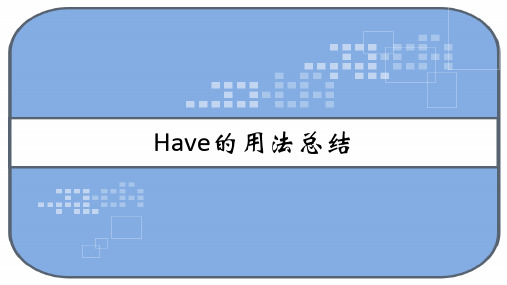
Making a sentence by using these words and expressions
C: Expressions
• Have a look = look at it • have a go = ride it • have a good journey • have a moment = have some time • have a word with sb. = speak to sb. • have a good time = fun, enjoy • have to
Warming up (A):
• Q: What can you have: You can ... 1: have lunch 2: have a party 3: have a lesson 4: have a cup of tea / coffee 5: have a shower ['ʃaʊə]
Have:
• 1: 拥有,持有 own, hold: I don't have that much money on me. • 2: 性质,特征 quality, feature: They have a lot of courage. • 3: 有(表示 relationship): He's got three children. • 4: 应该,必须 should, must: I've got a lot of homework tonight. • 5: 进行活动 do sth:I had a swim to cool down. • 6: 吃喝吸烟等 eat, drink, smoke: I had a cigarette while I was
- 1、下载文档前请自行甄别文档内容的完整性,平台不提供额外的编辑、内容补充、找答案等附加服务。
- 2、"仅部分预览"的文档,不可在线预览部分如存在完整性等问题,可反馈申请退款(可完整预览的文档不适用该条件!)。
- 3、如文档侵犯您的权益,请联系客服反馈,我们会尽快为您处理(人工客服工作时间:9:00-18:30)。
A. Do you have B. Are you have C. Are you D. Do you are have
4. I B a ping-pong bat, and Meimei
a volleyball.
A. have; have B. have; has C. has; has D. has; have
Does Mary have a brother? 实义动词have(有)Y的e用s法, she does./No, she doesn’t.
口诀
动词have表示“有”, 位置就在主语后。 “三单”主语用has, 其他人称用have。 一般问句句首do/does添。 否定句子也一样, don’t /doesn’t主语后面站。
You have a farm. They have apples.
Do you have a farm? Yes, I do./No, I don’t .
Do they have apples? Yes, they do./No, they don’t.
It has a big mouth.
Does it have a big mouth? Yes, it does./No, it doesn’t.
5. -- C Bob have a red pen?
--Yes, he
.
A. Does; do B. Do; do C. Does; does D. Do; does
6. --Do you have a tennis ball?
-- B . But I have a baseball.
A. Yes, I do B. No, I don’t
They don’t have apples.
It has a big mouth.
He has two big eyes. She has a cat.
Mary has a brother.
It doesn’t have a big mouth.
He doesn’t have two big eyes. She doesn’t have a cat.
7. My parents B a big house.
C. Yes, I have D. No, I’m not
具体用法
第一人称: I have…
第二人称: You have…
第三人称: He / She / It / Jane has…
复 数: They / The girls / The boys /The children /
Ben and Jane have… 实义动词have(有)的用法
例句:
• 我有一只狗。 • 你有一家 农场。 • 他们都有苹果。 • 它有一个大嘴巴。 • 他有一双大眼睛。 • 她有一只猫。 • Mary有一个弟弟。
实义动词have“有”的用法
实义动词have(有)的用法
实义动词have作“有”讲时,强调“所属关系”,表示“拥有” 的意思。其主语常为人或物。
I have a baseball.
我有一个棒球。
He has two ping-pong bats。 他有两个乒乓球拍。
--Do you have a basketball?
He doesn’t have two volleyballs. 他没有两个排球。
实义动词have(有)的用法
1. 实义动词have (有)在一般现在时的肯定句中,当主语 是第三人称单数时用has, 当主语是其他人称时用have。
口诀
我和你都用have, Has 用于他,她,它, 所有复数都用have。
时,要借助助动词do和does, 且have要用原形。当主语
是第三人称单数时助动词要用does, 当主语是其他人称时
助动词用do.
I have a dog.
I don’t have a dog.
You have a farm.
You don’t have a farm.
They have apples.
I have a dog.
You have a farm . They have apples.
It has a big mouth.
He has two big eyes. She has a cat.
Mary has a brother.
实义动词have(有)的用法
2. 实义动词have (有)的一般现在时的肯定句变为否定句
Mary doesn’t have a brother.
实义动词have(有)的用法
3. 实义动词have (有)的一般现在时的肯定句变为疑问句 时,也要借助助动词do和does, 且have要用原形。当主 语是第三人称单数时助动词要用does, 当主语是其他人称
时助动词用do. 肯定回答:Yes, 主语(人称代词)+ do / does。否定回答:No, 主语(人称代词)+ don’t / doesn’t。
He has two big eyes. She has a cat.
Does he have two big eyes? Yes, he does/No, he doesn’t.
Does she have a cat? Yes,she does./No, she doesn’t.
Mary has a brother.
你有一个蓝球吗?
--Yes,I do./No, I don’t.
是的e have a tennis ball? 她有一个网球吗?
--Yes, she does./No, she doesn’t. 是的,她有/不,她没有。
They don’t have a soccer ball. 他们没有一个足球。
实义动词have(有)的用法
单项选择。 1. C you have a volleyball?
A. Are B. Is C. Do D. Does
2. I don’t C a tennis bat, but Kate one.
A. has; have B. have; have C. have; has D. has; has
